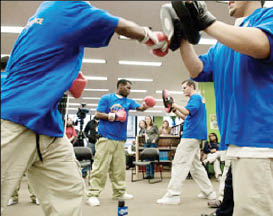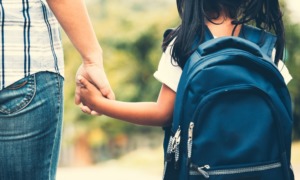A sports version of a program developed by a youth worker on a spiritual retreat has been chosen as the latest in an arsenal of weapons to combat youth violence in Chicago.
 |
|
BAM: Youth take part in an exercise designed to help them learn to focus and deal with anger. Photo: Courtesy of Youth Guidance |
The Becoming a Man (BAM) program, developed by Tony DiVittorio of the nonprofit Youth Guidance of Chicago, last month won a violence prevention design contest sponsored by the University of Chicago Crime Lab.
The award enables a new “sports edition” of BAM to serve 700 seventh- through 10th-graders in 15 Chicago schools. The effort will be funded with $1 million in grants, and BAM will be evaluated by the Crime Lab.
Although violence has beset Chicago for decades, BAM comes to the fore at a particularly troubling time in the Windy City. In the wake of the brutal beating death of 16-year-old honor student Derrion Albert in late September, the city’s school system announced plans to implement a mentoring program designed for youths most at risk of getting shot. (See “Will Mentors Shield Youths from Violence?”)
DiVittorio said he got the idea for BAM while going through the New Warrior Training Adventure of the ManKind Project, a nonprofit that aims to help men develop themselves. In the forest for a weekend retreat, he beat drums, did “spiritual work” and dealt with and confronted the emotional wounds he experienced from having an abusive, alcoholic father and a mother who was virtually absent. “It was a life-altering experience,” he said.
A clinical counselor, DiVittorio combined the spiritual awakening he got from the Mankind Project with his clinical training and developed BAM in 2001 for Youth Guidance, which creates and implements school-based programs for at-risk kids. He is program manager there.
A place to talk ?
Operating at Roberto Clemente High School since 2001, the program seeks to equip youths with coping skills and to decrease destructive behavior. Youths leave their regular classrooms to meet as a group twice a week with a BAM counselor. During those sessions, youths are given the opportunity to speak about what’s going on in their lives and what’s making them mad, sad, happy or afraid. The idea is to give the youths a venue to speak their minds about personal challenges without fear of ridicule or feeling pressured to put up a front, and to register their concerns with someone who has the time to listen.
BAM also features field trips, movies, food celebrations and such group-building activities as falling into the arms of other members. DiVittorio said the youths do “visionary goal-setting” and think about what kind of men they will be and what kind of character they will have five years from now. “They start to see the connection between their current behavior and that vision,” DiVittorio said.
The program has not been evaluated. DiVittorio said he has witnessed aggressive youths become calmer, withdrawn youths become more expressive, and youths taking more responsibility for their actions.
Roseanna Ander, executive director of the Chicago Crime Lab, says the sports proposal was chosen because some research has shown the “cognitive behavior therapy” approach used by BAM to be effective. The therapy is meant, among other things, to help individuals assess whether others are a real or perceived threat and to not overreact – a common factor in many of Chicago’s homicides, Ander said.
Another reason BAM got selected is cost, she said. The other programs would have required more funding than the university secured for it winner. Funders include the MacArthur Foundation, the Joyce Foundation and Chicago Community Trust.
BAM-Sports Edition will be run in partnership with World Sport Chicago, a nonprofit that seeks to introduce youths to Olympic sports. DiVittorio said it will incorporate some “unorthodox” but character-building sports, such as mixed martial arts and archery.
He said the sports component will serve a variety of aims. On a basic level, they will consume a couple of hours of free time and enable the youths to burn energy after school. He also hopes the activities will help the youths build self-esteem.
“I don’t think you get self-esteem by sitting in a self-esteem group,” DiVittorio said. “I think you get self-esteem by accomplishing and doing something.”
Contact: Youth Guidance (312) 253-4900.






























